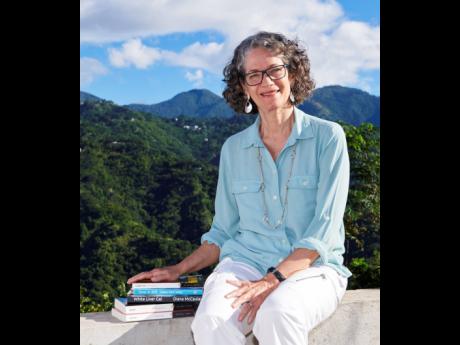McCaulay: Writing can be a lifelong companion
Diana McCaulay has leveraged her love for nature and her palette of experiences as a source of inspiration for her literary work. The seasoned Jamaican author is being recognised for her creative flair as she has been shortlisted for the 2022 Commonwealth Short Story Prize for her book B ridge Over the Yallahs River.
This year, 26 stories have been shortlisted for the world’s most global literature prize, with writers drawn from 20 diverse Commonwealth countries, including from Papua New Guinea, Eswatini, and St Vincent and the Grenadines.
It has been an exciting journey for McCaulay, who published her first book, Dog Heart, in 2010.
“I’m thrilled. The Commonwealth writing prize is perhaps the first writing prize I became aware of as a very young person, and I decided that I wanted to win it,” McCaulay said in a Gleaner interview.
This is the fifth time McCaulay has entered the competition, but the first she has made the cut of the creme de la creme since being ruled the 2012 regional winner. Her third novel, The Dolphin Catcher, told the story of the determined search by a young boy whose fisherman grandfather is lost at sea.
The lens of literature offers a different perspective of the sometimes antagonistic environmental campaigner who never shies away from arm-wrestling government ministers or National Environment and Planning Agency officials in debates over sustainable development.
Connecting characters with nature has become a hallmark of McCaulay’s style.
“I don’t know how you create anything, whether it is a painting or even music. I think it all has its roots in nature and what is around us. What I tend to focus on is the relationship with human beings to the place in which they live and what are the stories that come out of that,” she said.
Bridge Over the Yallahs River is no different. The story is about a rapidly urbanising rural village whose bridge is washed away during a storm. That tragedy sparks a rebuilding process that gives insight into the community itself.
Recounting the inspiration for that work, McCaulay said her interest was piqued by the phenomenon of collapsing bridges and how hearts and minds combine to rebuild those structures. But the narrative of reconstruction has implications for who gets the work and how it affects lives in the affected communities.
MYSTERIOUS PROCESS
McCaulay, who has just finished her sixth novel, is a voracious reader who is driven by a desire to write riveting stories with memorable characters that are profoundly rooted in the Jamaican experience.
For her, the creative process is “mysterious”, emerging serendipitously from exercise at the Mona Dam or staring into the great beyond. She concedes that the initial draft “is usually rubbish”, but there’s always a kernel of credibility on which to build.
Critical feedback is a key part of the creative process.
McCaulay believes that more emphasis should be placed on the arts, particularly on instilling a culture of readership.
She has been heartened by the rise of young Bookstagrammers who are using the tools of social media to bring attention to reading.
McCaulay is encouraging youth who may be daunted by the prospect of writing to take up the pen and let their story unfold.
“If you feel to write, just write. It can be a lifelong companion. It is a way of figuring out how you feel, and it is a way of putting yourself in other people’s shoes … ,” she said.
“I think reading and writing is one of the greatest opportunities and pastimes that is open to a human being.”

